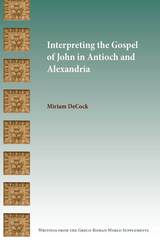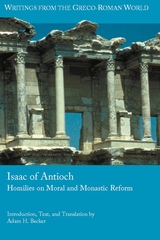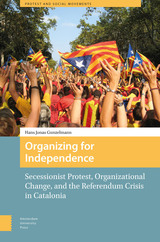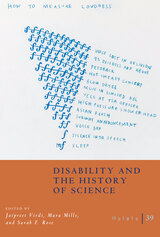
Pagans’ advocate.
A professing pagan in an aggressively Christian empire, a friend of the emperor Julian and acquaintance of St. Basil, a potent spokesman for private and political causes—Libanius can tell us much about the tumultuous world of the fourth century.
Born in Antioch to a wealthy family steeped in the culture and religious traditions of Hellenism, Libanius rose to fame as a teacher of the classics in a period of rapid social change. In his lifetime Libanius was an acknowledged master of the art of letter writing. Today his letters—about 1550 of which survive—offer an enthralling self-portrait of this combative pagan publicist and a vivid picture of the culture and political intrigues of the eastern empire. A. F. Norman selects one eighth of the extant letters, which come from two periods in Libanius’ life, AD 355–365 and 388–393, letters written to Julian, churchmen, civil officials, scholars, and his many influential friends. The Letters are complemented, in this two-volume edition, by Libanius’ Autobiography (Oration 1), a revealing narrative that begins as a scholar’s account and ends as an old man’s private journal.
Also available in the Loeb Classical Library is a two-volume edition of Libanius’ Orations.

Pagans’ advocate.
A professing pagan in an aggressively Christian empire, a friend of the emperor Julian and acquaintance of St. Basil, a potent spokesman for private and political causes—Libanius can tell us much about the tumultuous world of the fourth century.
Born in Antioch to a wealthy family steeped in the culture and religious traditions of Hellenism, Libanius rose to fame as a teacher of the classics in a period of rapid social change. In his lifetime Libanius was an acknowledged master of the art of letter writing. Today his letters—about 1550 of which survive—offer an enthralling self-portrait of this combative pagan publicist and a vivid picture of the culture and political intrigues of the eastern empire. A. F. Norman selects one eighth of the extant letters, which come from two periods in Libanius’ life, AD 355–365 and 388–393, letters written to Julian, churchmen, civil officials, scholars, and his many influential friends. The Letters are complemented, in this two-volume edition, by Libanius’ Autobiography (Oration 1), a revealing narrative that begins as a scholar’s account and ends as an old man’s private journal.
Also available in the Loeb Classical Library is a two-volume edition of Libanius’ Orations.

A nuanced study of early Christian exegesis
Miriam DeCock analyzes four important early Christian treatments of the Gospel of John, including commentaries by Origen and Cyril from the Alexandrian tradition and the homilies of John Chrysostom and the commentary of Theodore of Mopsuestia, which represent Antiochian traditions. DeCock maintains that the traditional distinction between nonliteral and literal interpretations in these two early Christian centers remains helpful despite recent challenges to the paradigm. She argues that a major and abiding distinction between the two schools lies in the manner in which Alexandrian and Antiochian authors apply the gospel text to their respective communities. DeCock demonstrates that the Antiochenes find primarily literal moral examples and doctrinal teachings in John's Gospel, whereas the Alexandrians find both these and nonliteral teachings concerning the immediate situation of the church and of its individual members.
Features
- An examination of each author's interpretations of a selection of texts
- Focused explorations of John 2; 4; and 9-11 in early Christian exegesis
- A study of early literal non-literal interpretations of John's Gospel

This volume offers a critical edition and annotated translation of twenty metrical homilies attributed to Isaac of Antioch, a late fifth-century CE Syriac poet. The works in this collection, the majority of which are examples of the Syriac rebuke genre, are aimed at the moral reformation of the Syrian Christian community. The introduction, which provides the first detailed study of the manuscript tradition of the corpus as a whole, identifies four different Isaacs whose writings were intermingled already in late antiquity and develops criteria for distinguishing among their works. Scholars and students of church history will find this a valuable resource for the study of Syriac poetry and homiletics, Christian ideas of moral reform, and late antique monastic and lay devotional culture.
READERS
Browse our collection.
PUBLISHERS
See BiblioVault's publisher services.
STUDENT SERVICES
Files for college accessibility offices.
UChicago Accessibility Resources
home | accessibility | search | about | contact us
BiblioVault ® 2001 - 2024
The University of Chicago Press









